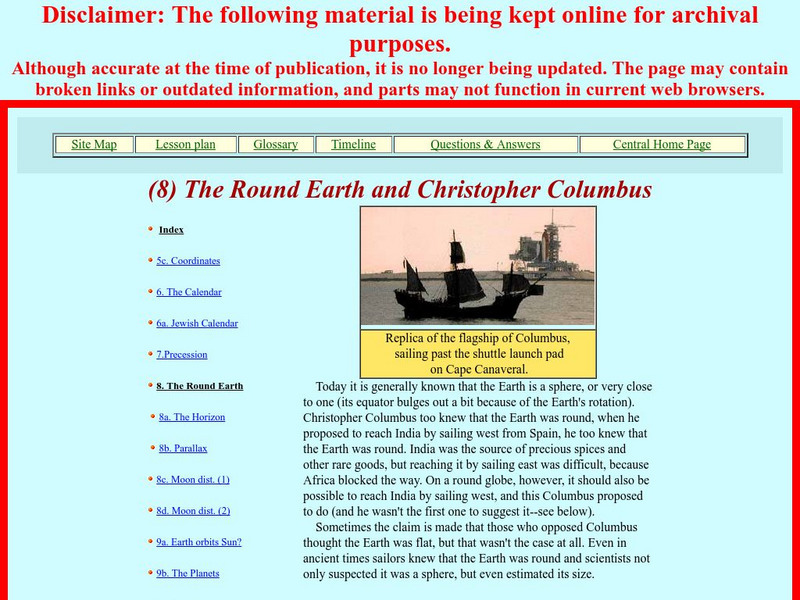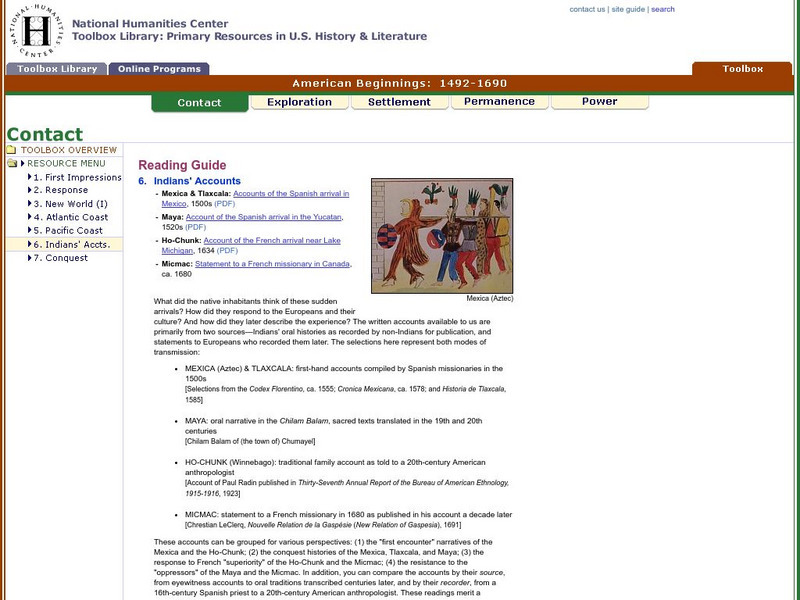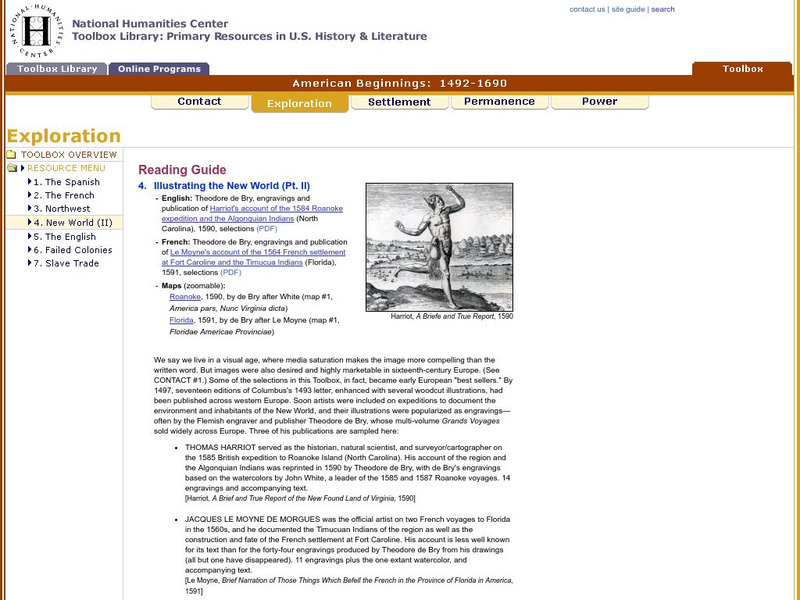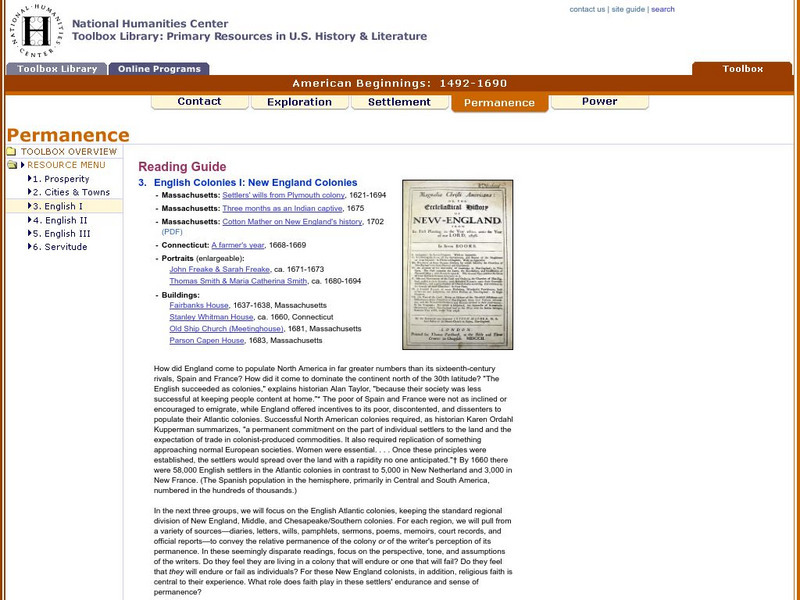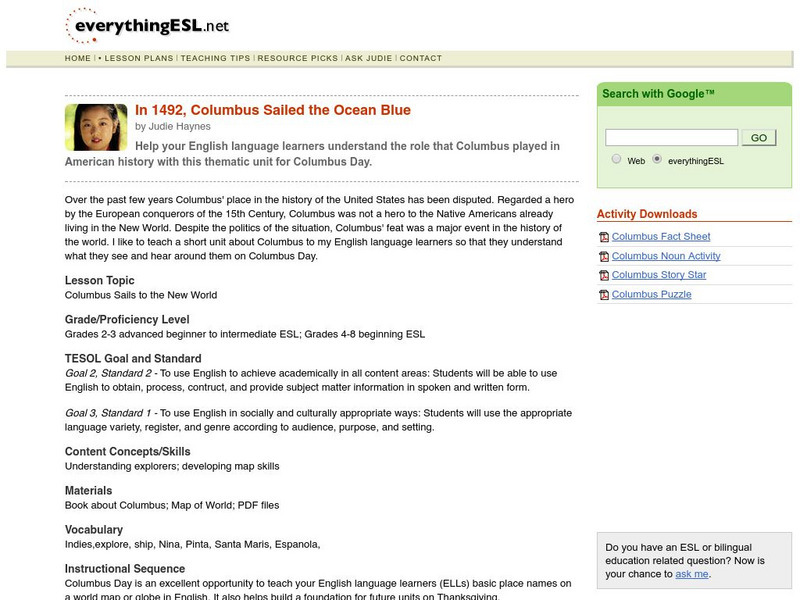Student Handouts
Letter from Christopher Columbus to Luis de Sant Angel Announcing His Discovery (1493)
When Christopher Columbus landed, he found many things to comment on. Have your class read this letter that he wrote to Luis de Sant Angel in 1493. The text is split up into sections. Each section is paired with two to three...
Curated OER
The European Conquest of the Americas
Witness the birth of the Americas in this presentation, which details the European Explorers who contributed to adding vital details on our modern-day maps. Viewers' worlds will literally expand after seeing the results of Cortes and the...
Curated OER
The World, Flat?
In this discovery of America worksheet, students name the three ships that sailed with Columbus to America. Students research why people believed the world was flat and write an essay.
Curated OER
Amerigo Vespucci: March 9, 1945
In this writing prompt worksheet, students learn the date March 9, 1945 as the day Amerigo Vespucci was born. Students then write about the following prompt: 'What part of the world would you like to sail to and explore? Why did you...
NASA
Nasa: From Stargazers to Starships: The Round Earth and Christopher Columbus
Despite popular myth, people of the 15th century actually realized that the earth was round. Some scientists had even estimated the size of the Earth. Here's an interesting explanation from a section of an online textbook on the...
National Humanities Center
National Humanities Center: Toolbox Library: Indians' Accounts, American Beginnings: 1492 1690
Four accounts by Native Americans of their complex responses to and reactions toward European explorers near present-day Canada and Mexico.
National Humanities Center
National Humanities Center: Toolbox Library: New World: Part Ii, American Beginnings: 1492 1690
Two European maps of Florida and Roanoke, and a British and a French account-with associated engravings of these settlements-that promote a European interpretation of and claim over these areas.
National Humanities Center
National Humanities Center: Toolbox Library: Enslaved Peoples, American Beginnings: 1492 1690
Two Spanish accounts of enslaved Indians in the Caribbean and enslaved Africans in Mexico and statements of the difficulty of maintaining slavery and the lurking threat of a slave revolt.
National Humanities Center
National Humanities Center: Toolbox Library: English I, American Beginnings: 1492 1690
Portraits of early New Englanders as well as four buildings from seventeenth-century New England that accompany accounts in those British colonies of struggles, Indian hostilities, and economic success.
National Endowment for the Humanities
Neh: Edsit Ement: Other Worlds the Voyage of Columbus
This site has a lesson plan designed for grades 9-12. The lesson plan deals with understanding the culture from which Columbus came, Renaissance Europe, and the culture he found in the New World.
Library of Congress
Loc: 1492: An Ongoing Voyage
An exhibit by the Library of Congress supplies diverse facts on the famous 1492 voyage. The exhibition first examines the encounter between the European explorers and the native people. They explore five geographical areas: The Caribbean...
Other
Ships of Discovery: Columbus's Lost Ships
We all know about the Nina, Pinta, and the Santa Maria, but what about the rest of Columbus' ships? He was a busy man after the initial discovery. This site is by a group of archaeologists who try to find historic underwater wrecks....
Everything ESL
Everything Esl: In 1492, Columbus Sailed the Ocean Blue
Help your ESL students understand the role of Columbus in the history of America. Take the opportunity to teach map skill. This lesson plans include the TESOL standards and many downloads.
Other
National Maritime Museum: Ships and Seas: Christopher Columbus
Learn about Christopher Columbus's reason for sailing west instead of east. Also, discover what he found on his voyages and his return journeys.
Curated OER
Western Hemisphere, Detail of Universalis Cosmographia, 1507
English, Spanish, and Portuguese maps and letters about exploration and impressions of the Western hemisphere in the early 1500s. T






